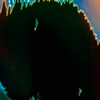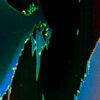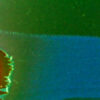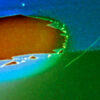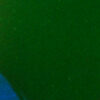The dog had appeared last year on Selma’s birthday. My father had given Selma a book of photographs of Alaska and said with a wink: ‘There’s another surprise coming.’
Selma had never been to Alaska and didn’t want to go. ‘Thank you,’ she said, and put the book on the shelf in the living room with the other photography books. Every year, my father gave her a new book of photographs showing the world he felt she urgently needed to let into her life.
Elsbeth gave Selma a pound of coffee and a jar of snail balm, which, according to Elsbeth, could turn gray hair blond. Sad Marlies gave her two cans of bargain mushrooms, and the optician gave her, on her request, ten boxes of Mon Chéri. What Selma liked best about Mon Chéri was the filling. ‘The filling is so calming,’ she would say. She usually bit off the front of the Mon Chéri, sucked out the cherry and the liqueur, and gave the chocolate shell to me.
We sang ‘Happy Birthday’ and Martin took the opportunity to try to lift Selma but without success. We ate cake and my father told us about his psychoanalysis, something he loved to talk about. ‘Speaking of psychoanalysis,’ my father would say, even when no one in the room had said anything on the topic.
My father’s psychoanalyst was Dr Maschke, whose practice was in the county seat. Soon after my father announced that he was going into analysis – he announced it the way others announce they’re getting married – there was a Tatort episode on television, in which the main suspect was also named Maschke. I wasn’t allowed to see it, not being nearly old enough for a crime show, but I watched in secret through the crack of the living room door.
The Tatort police detective sensed that Maschke was a criminal from the very beginning. He’d received an anonymous letter that said, ‘Maschke is planning something.’ Since then, whenever my father said, ‘I’m off to Dr Maschke’s, see you later,’ I pictured the anonymous letter claiming Maschke was planning something, something serious enough to warrant an anonymous letter.
Knowing that my father talked about her to Dr Maschke made Selma uncomfortable. Of course, he had to talk about her, since mothers are the main suspects in psychoanalysis. I didn’t like the idea that my father was telling him absolutely everything about Selma either, because I worried that Maschke was planning something against her. I hadn’t been able to see the whole Tatort episode because Selma caught me watching and sent me back to bed. So I only found out many years later that Maschke, the apparent prime suspect, was in fact completely innocent of all the terrible things that had occurred; Maschke had not tried to take anyone’s life. Maschke hadn’t been planning anything at all. In the end, it turned out that Maschke was one of the good guys.
On that day, too, over Selma’s birthday cake, when the conversation was actually about Mon Chéri candy and the Piedmont cherry filling and Elsbeth declared that the liqueur-soaked cherries didn’t come from Piedmont at all, it was just something she claimed when tipsy, my father responded, ‘Speaking of psychoanalysis . . .’ He then told us that Dr Maschke was a luminary in his field, something that had been proven yet again just the day before. Previously, the patient whose session was just before my father’s had always come out of Dr Maschke’s office with a look of profound despair in his eyes.
‘I’d never seen a look of such abysmal despair in anyone’s eyes,’ he said. And now, a mere two sessions later, the very same patient practically skipped out of the office as if liberated. ‘So here’s to psychoanalysis,’ my father said, and raised his glass. ‘And to the birthday girl, too, of course.’
Sad Marlies asked, ‘Do you see despair in my eyes, too?’
My father turned to her, took her chin in his hand, and gazed into her eyes for a moment.
‘No,’ he replied, ‘just an incipient eyelid inflammation.’ The sound of my mother’s steps echoed in the landing. ‘Here’s Astrid,’ my father said, ‘with the surprise.’
My mother opened the kitchen door and walked in with the dog. My father jumped up, bounded over to my mother, and let the dog off the leash.
The dog looked around and ran to Martin and me. He greeted us exuberantly, as if we were old friends he had missed for a long time and unexpectedly met again at lively surprise party in his honor. Martin put his arms around the dog and lifted him. Martin beamed with delight as I’d never seen him beam before.
Selma stood up abruptly, as if an invisible person had just said, ‘Please rise.’
‘It wasn’t my idea,’ my mother said. ‘Happy birthday, Selma.’
‘What is it?’ asked Elsbeth, who had started to wash the dessert plates and raised her rubber-gloved hands high, as if that would stop the dog from jumping up on her. He jumped up anyway.
‘A mutt,’ my father said. ‘Part Irish wolfhound.’ Irish wolfhounds are the largest dogs in the world, as everyone in Selma’s kitchen knew. My father had told us. ‘A shoulder height of thirty-six inches,’ he’d said.
My father liked to comment on the heights of humans and animals. As far as people were concerned, his estimates were often wrong, but he wouldn’t let anyone correct him. He found Martin and me small for our age, even though we were both of average height. Even as a child he would say to Selma, who was taller than everyone around, ‘You’re so small, Mama,’ when she bent down to him.
‘I think he’s also part poodle, so he shouldn’t get too big,’ my father said in a conciliatory tone. He looked at the dog with satisfaction. ‘Maybe he’s even got some cocker spaniel in him. They’re not very intelligent, but they are friendly.’ My father smiled placatingly, as if that description fit each of us, too. ‘My guess is that he’ll be medium-sized. Like a standard poodle.’
Whenever a new person or animal joined us, we all started talking at once about what or whom he, she, or it resembled. Martin saw him as a young brown bear that had gotten its color and habitat wrong; Elsbeth saw a mini-Shetland pony who was missing hooves due to a caprice of nature; the optician suspected he was an as-yet-undiscovered land mammal; and sad Marlies, who had taken out her compact and was examining her eyelids, glanced up and said, ‘I have no idea what it is, but somehow it looks like a bad winter.’
It was true. The dog was the color of slush. It was watery gray and shaggy as only purebred Irish wolfhounds can be. Its body was still small, but its paws were as big as a bear’s, and we all knew what that meant.
Selma was still standing in front of the kitchen bench. She looked at the dog for a long time. Then she looked at my father as if he were a gift shop.
‘But I didn’t ask for a dog,’ she said.
‘You didn’t ask for a coffee table book about Alaska, but you’ll enjoy it for a long time,’ Elsbeth observed.
‘You’ll enjoy the dog, too, he seems very lively,’ the optician said, and Selma looked at the optician and Elsbeth as if they were purebred cocker spaniels.
‘He’s not for you. He’s mine,’ my father said. ‘I bought him this morning.’
Selma sighed with relief and sat down, but quickly stood up again when my father said, ‘I can only keep him if you’ll look after him now and then.’
‘How often?’ Selma asked.
‘I’ve got to go,’ said my mother, who had remained standing in the doorway. ‘Unfortunately, I can’t stay.’ My mother could never stay long.
‘Well, relatively often,’ my father said, and everyone knew that ‘relatively often’ meant during office hours.
‘Bye, then,’ my mother said.
No one said anything for a long time, especially not Selma. Since the birthday girl wasn’t talking anymore, everyone decided it was time to go. Besides, my father wasn’t talking anymore either. Selma’s and my father’s combined silence was at least as big as an Irish wolfhound with a shoulder height of eighty inches. So the optician kissed Selma on the cheek and left. Elsbeth patted the dog, pulled off the rubber gloves, and left. Marlies stopped examining her supposedly visible incipient eyelid inflammation and her supposedly invisible despair and left. Martin lifted the dog once more and left. Selma and my father pushed their vigorous silence outside onto the front doorsteps.
I sat down on the steps next to Selma and ate the empty chocolate shell of a Mon Chéri. The dog lay down on my feet. I could feel its heartbeat on my toes. The dog was tired. It had been exhausting to encounter so many old, long-lost friends he’d never met before.
On the far side of the meadow at the edge of the forest, a deer appeared. Selma got up, walked to the garage, opened the garage door, and slammed it shut with all her strength. It was Tuesday, and on Tuesdays in season Martin’s father, Palm, went hunting, and Selma deliberately frightened the deer so that it would disappear into the underbrush, safe from Palm’s shotgun.
The deer startled and disappeared. The dog startled, too, but did not disappear. Selma returned to the house from the garage, and it is incomprehensible that we still hadn’t noticed her resemblance to Rudi Carrell. ‘Here comes Rudi Carrell,’ would have been a perfectly justifiable reaction, ‘Rudi Carrell is walking from the garage straight toward us.’
Selma sat down on the doorsteps again, cleared her throat, and looked at my father. ‘Can’t Astrid watch him?’
‘That’s not possible with the flower shop,’ my father said, and Selma looked like she suddenly wished she had a shop too.
‘I bought him for therapeutic reasons,’ my father explained.
‘So the dog is part of Dr Maschke’s nonsense,’ Selma said.
‘Don’t be so dismissive, it’s because of my pain,’ my father said.
‘What pain is that?’
‘Mine,’ my father answered. ‘My encapsulated pain.’
‘But from what?’ Selma asked, and my father replied,
‘That’s just it. I don’t know – it’s encapsulated.’ And I thought that even with encapsulated things you know what’s in them, but maybe that’s only the case when there’s no pain in the capsule, just medicine or astronauts.
My father explained that Dr Maschke had figured out how his pain could be accessed.
‘I have to externalize my pain, hence the dog,’ my father whispered excitedly.
‘I beg your pardon?’ Selma said. She wasn’t indignant but instead seemed moved and a little incredulous. My father started to explain how important it was for him to externalize his pain as Dr Maschke recommended.
‘Hang on a minute,’ Selma said. ‘So the dog is the pain. Have I got that right?’
‘Exactly,’ my father said, relieved. ‘The dog is a metaphor, so to speak, a metaphor for the pain.’
‘A standard poodle-sized pain,’ Selma said.
The dog raised his head and looked at me. His eyes were very gentle, very black, very wet, and very big. Suddenly I knew we’d all been waiting for him, especially Martin.
‘You can leave him with Palm during your consulting hours,’ Selma suggested.
‘Are you insane?’ my father asked.
I looked at the dog. It was very clear that he’d be useless as a hunting dog. Palm only had hunting dogs. He kept them on chains in the yard; the chains stretched taut and held the dogs back as they lunged at me, barking, whenever I came to get Martin.
‘He’d be a useless hunting dog,’ I said.
And Selma said, ‘That’s exactly the point,’ because she believed she wouldn’t have to worry about the deer as much if Palm had a gentle and therefore completely useless dog at his side.
I said, ‘Palm has no time for dogs that aren’t aggressive.’ There were many things Palm had no time for; actually, he had no time for anything besides high-proof hunting dogs and high-proof alcohol, certainly not for his own son, because Martin wasn’t high-proof enough for him. Selma knew that. Everyone did.
Because Selma was so old, she knew Palm from another life, from life before Martin and me. Selma had told me that before he’d started drinking, Palm was exceptionally well informed about the world and its sources of light. He knew everything about the moon’s elliptical orbit and its relation to the sun. A hunter, he believed, should know how the world is illuminated.
‘Can we keep him, please?’ I asked.
The deer reappeared in the meadow. This was unusual. Normally it was enough for Selma to slam the garage door once. She stood up and walked over to the garage. This time she slammed the door twice in a row and the deer disappeared.
Selma sat back down next to us.
‘What should we call him?’ she asked. ‘Did Dr Maschke offer an opinion?’
‘Pain,’ my father suggested. ‘Pain is a possibility.’
‘Not enough syllables,’ Selma said. ‘Imagine calling out ‘Pain, come here, Pain!’ I desperately wanted to keep the dog, so I thought quickly and feverishly how you could best call ‘Pain’. When I finally came up with something, I said it out loud, and the dog jumped up and ran off. Selma said that you couldn’t blame him, she would have run away at that suggestion, too. We set off into the dusky forest and soon found the dog in the underbrush, where he had hidden from my suggestion like the deer from Palm’s shotgun: I’d suggested, ‘Ouchy, we can call him Ouchy.’
The dog (whom we finally named Alaska – it was Martin’s idea; my father agreed because Alaska is big and cold and that’s true of pain as well, at least of an encapsulated one) grew quickly. He surprised us every morning, because like everyone else he grew mostly at night. Some nights, I interrupted my own sleep and growth to watch Alaska as he slept and grew. In our house at night, the only thing you could hear was the creaking and rustling of the trees in the wind outside. In my ears, however, it didn’t sound like the creaking and rustling of trees in the wind but like the creaking and rustling of bones, the sound of Alaska’s bones growing in all directions as he slept.
Image © Ignotus the Mage
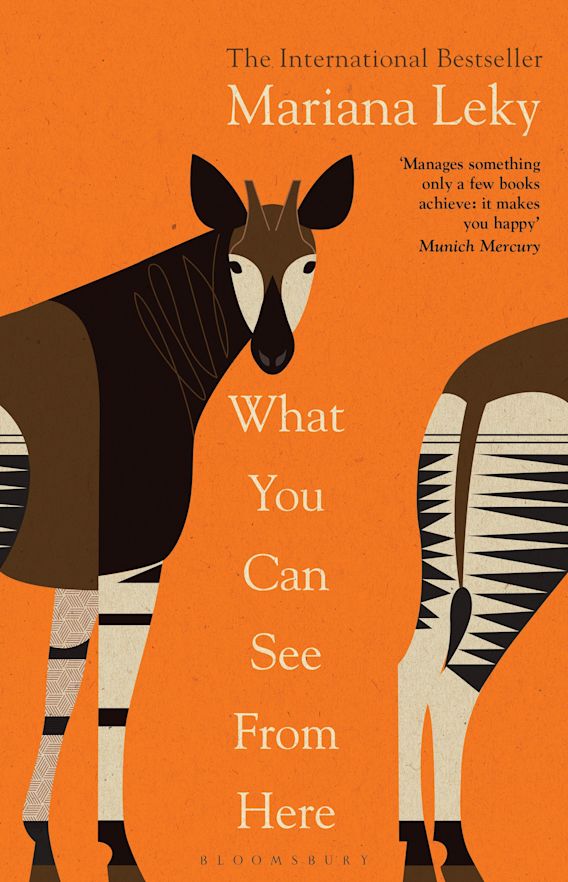
This is an excerpt from What You Can See From Here by Mariana Leky, translated by Tess Lewis, published by Bloomsbury in the UK and Farrar, Straus and Giroux in the US.


